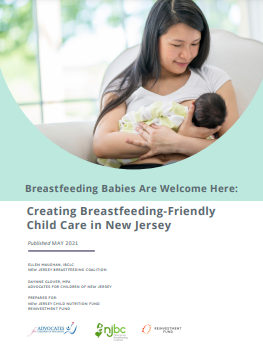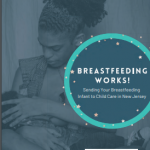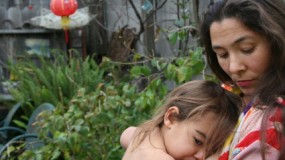Now more than ever, providers of early care and education (ECE) in child care centers and family child care homes serve as invaluable “essential workers,” entrusted with the well-being and protection of infants and children while their parents cannot be with them. Early childhood educators are important mentors as well for new parents, providing them information and guidance on common childhood concerns. Child care staff also play a critical role in supporting children’s health and nutrition, especially when it comes to breastfeeding. The return to work outside the home or to school makes continued breastfeeding more difficult for new parents, but research shows that mothers who are supported by child care providers are more likely to continue breastfeeding for six months and beyond.
New Jersey Breastfeeding Coalition has developed two valuable educational resources, a training and a toolkit, to help child care providers learn how to support breastfeeding parents and their babies.
Training Program

The one-hour online training, “Becoming a Breastfeeding-Friendly Childcare Provider,” and its Spanish-language version, “Convertirse en un Proveedor de Cuidado Infantil Pro Lactancia Materna,” are free and available on the NJCCIS website for one hour of Professional Development. The training is appropriate for childcare professionals in both center-based and family home settings. The broader community of childcare stakeholders are also welcome to complete the training.
The five modules cover:
- the importance of breastfeeding;
- supporting families who are providing breast milk to their children;
- safe storage and handling of human milk;
- proper feeding practices;
- how to create and maintain a breastfeeding-friendly policy;
- plus a resource toolkit.
Childcare Providers
Register for the training and receive continuing education credit when completed on the New Jersey Child Care Information System (NJCCIS) website. Search for Event ID 136030 for the English version and Event ID 138799 for the Spanish version.
For those not registered with NJCCIS
The training series is available directly through these links. Use password breastfeeding (all lowercase).
- Becoming a Breastfeeding Friendly Child Care Provider (English) – password: breastfeeding
- Convertirse en un Proveedor de Cuidado Infantil Pro Lactancia Materna (Spanish) – password: breastfeeding
- Toolkit – English, Spanish – password: breastfeeding
Toolkit
Breastfeeding Babies Are Welcome Here: Creating Breastfeeding-Friendly Child Care in New Jersey
This toolkit was authored by the New Jersey Breastfeeding Coalition and Advocates for Children of New Jersey with funding from the NJ Child Nutrition Fund and the Reinvestment Fund, This publication provides abundant resources and evidence-based information on easing the breastfeeding journey for lactating parents as they transition to a child care setting. The booklet also included New Jersey laws on lactation support in the workplace for the families and child care staff as well as state child care regulations on feeding and handling of human milk.
Handouts
Breastfeeding Works: Sending Your Breastfeeding Infant to Child Care in New Jersey
For parents, maintaining breastfeeding and human milk feeding despite separation that comes from the return to work or school can be a time of anxiety and mystery. This booklet by Montclair State University is an essential how-to manual that provides information and resources to families as they navigate the transition of their infants to child care while continuing to breastfeed or provide human milk to them.



